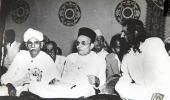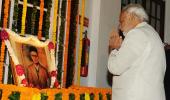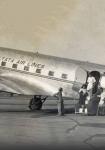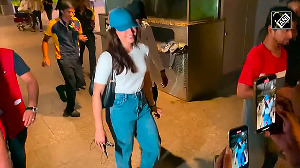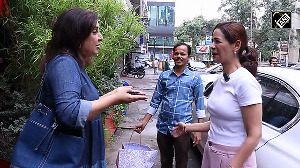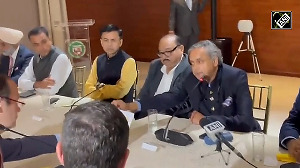'Absolute non-violence is not only sinful, but immoral.'
'This doctrine of non-violence benumbed the revolutionary fervor, softened the limbs and hearts of the Hindus, and stiffened the bones of enemies.'
A revealing excerpt from Vikram Sampath's Savarkar (Part 2): A Contested Legacy, 1924-1966.
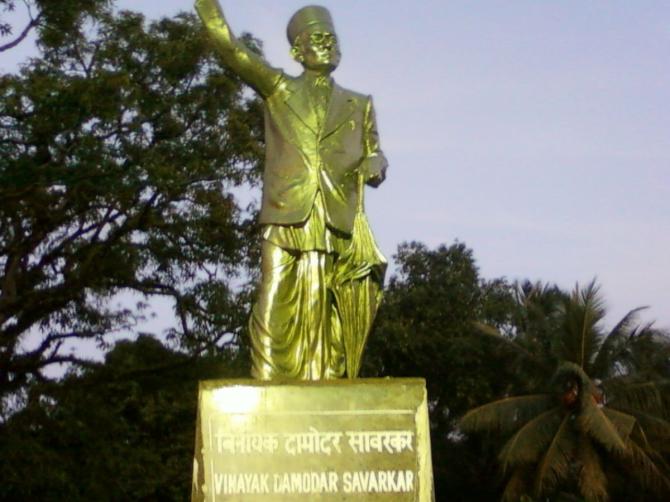
Among the last interviews that Savarkar gave was the one to Shridhar Telkar for the RSS magazine Organiser, for its Diwali edition of 1965:
Looking back, what are the most thrilling memories, which you still cherish?
Of course, memories of old keep haunting me. I treasure these thrilling memories. They are now a part of me and will remain with me till the end of my life.
The first thrilling event, which I still vividly remember was my dramatic escape from the steamer. It all happened like this: it was Sunday March 13 1910. I arrived in London from Paris. I was immediately arrested at the Victoria Terminus by the London police.
The arrest was made under a telegraphic warrant from the Bombay government. I was held under the Fugitive and Offenders Act of 1881.
The charges against me were:
1. Waging war or abetting the waging of war against His Majesty, the King Emperor of India;
2. Conspiring to deprive His Majesty the King of the Sovereignty of British India or a part of it;
3. Procuring and distributing arms, and abetting the murder of Jackson, the then collector of Nasik;
4. Procuring and distributing arms in London and waging war from London;
5. Delivering seditious speeches in India from January 1906 onwards and in London from 1908 and 1909.
I was put on the steamer SS Morea bound for Aden. I was a prisoner of the British in the steamer. And I realised what my fate would be once I reached homeland. So, I decided to escape from the jaws of death.
Luckily for me, the steamer anchored at Marseilles for repairs. I now made a dramatic decision, to escape somehow from the steamer. So I went to the bathroom and bolted the door from inside. My guard waited outside.
I jumped from the porthole into the sea and started swimming towards the harbor. The guards opened fire. And bullets whizzed by. I dodged them by diving, and cheated death. At last, I reached the harbour, and climbed the quay.
I was happy that at last I was on the soil of France -- a free man. But fate was cruel and unkind. The British guards pursued me and dragged me back to the steamer -- clearly a breach of international law -- for I had been arrested on a foreign land.
The second episode, which lingers in my mind is when I was sentenced on two occasions for transportation for life. This meant that altogether I had to remain in the Andamans cellular jail for fifty years.
If I had served my full term of imprisonment, I would have been released on December 24, 1960. But I was sent to Hindustan after 14 years in the Andamans to be interned for 13 years in Ratnagiri. Altogether, I remained a prisoner of the British for nearly 27 years.
The third event, which I shall always cherish, was when I met my young patriotic brother and my noble wife in cellular jail for the first time in 8 years. The Government had permitted them to see me in the Andaman Jail.
How can I express in cold words what I felt then? Anyhow, I was supremely happy to see and talk to my wife, who shared with me the sorrows and agonies of a revolutionary's life.

You have been a great revolutionary in your time and a great fighter for India's freedom. Tell me, how and why you became a revolutionary?
It happened like this. Somewhere round about 1897, the country was in the grip of famine and plague. The people suffered much during this critical period. The soul of the people was in agony.
The government did little to alleviate the sufferings of the people. Death and disease took a heavy toll of life. The excesses committed by the soldiers and the antics of the bullying incompetent, tyrant Rand, the plague commissioner, infuriated the Chaphekar brothers of Poona. They shot dead Rand and another Englishman. The Chaphekar brothers were tried and hanged.
The terrible news of their hanging stirred me. I was hardly 16 then. My enquiring mind became restless. I realised, even at that young age, the significance of the act of the Chaphekar brothers. I decided to take a vow -- a pledge to fight and die, if need be, for the freedom and liberty of my country.
So, at the dead of the night, I sat alone at the feet of our family deity -- the Armed Goddess Durga -- and invoked the blessings of the Great Mother, the source of Divine inspiration and strength.
I took a solemn vow before Goddess Durga to do my duty towards my country and to fulfill the noble mission of the martyred Chaphekar brothers. I also took a vow to drive out the Britishers from my beloved motherland and make my country free and great once again -- the glory that was Hind.
This, then, is how and why I became a revolutionary.
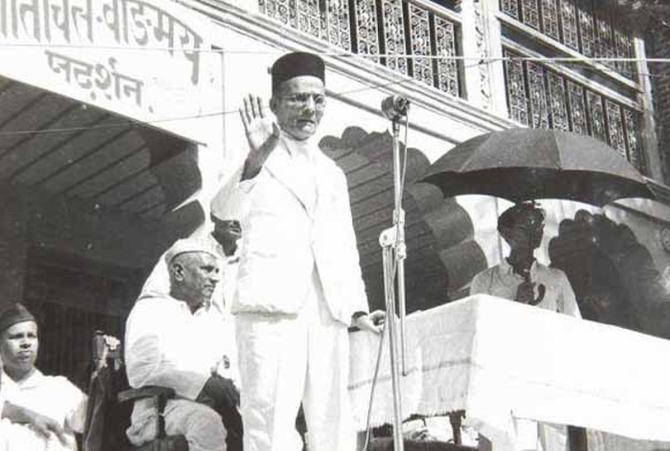
What are the factors, which contributed to the liberation of our country?
There are many factors, which contributed to the freedom of Bharat.
It is wrong to imagine that Congress alone won Independence for Hindusthan.
It is equally absurd to think that non-cooperation, Charkha and the 1942 'Quit India Movement' were sorely responsible for the withdrawal of the British power from our country. There were other dynamic and compelling forces, which finally determined the issue of freedom.
First, Indian politics was carried to the army, on whom the British depended entirely to hold down Hindusthan;
Second, there was a revolt of the Royal Indian Navy and a threat by the air force;
Third, the valiant role of Netaji Subhas Bose and the INA;
Four, the War of Independence in 1857, which shook the British;
Five, the terrific sacrifices made by thousands of revolutionaries and patriots in the ranks of the Congress, other groups and parties.
So, freedom came with blood, sweat and tears of countless men and women of Hindusthan.
Did Gandhiji and other Congress leaders persuade you at any time to join the Congress? If they did, why did you not join the Congress?
I have never believed in Gandhiji's doctrine of Non-Violence. Absolute non-violence is not only sinful, but immoral.
This doctrine of non-violence benumbed the revolutionary fervor, softened the limbs and hearts of the Hindus, and stiffened the bones of enemies.
The lambs resolved to lead a vegetarian life, but the wolves were not concerned with their pious resolution. Revolt, bloodshed and revenge have often been instruments created by nature to root out injustice.
I felt I could not join the Congress because of my fundamental differences with the Congress on their methods, policies and programme.
The Hindu Mahasabha would have joined the Congress in the 1942 movement if the Congress had solemnly guaranteed that it would irrevocably stand by the unity and integrity of India and that the Congress would not make any pact with the anti-national Muslim League.
The people now know that our dream of a free, independent, Akhand Hindusthan was systematically sabotaged by Congress leadership.

What is the India of your dreams?
My India would be a democratic State in which people belonging to different religions, sects or races would be treated with perfect equality.
None would be allowed to dominate others.
None would be deprived of his just and equal rights of free citizenship, so long as everyone discharged the common obligation, which he owed to the State as a whole. Hindusthan, the motherland and the holy land of the Hindus, from the Indus to the Seas would be an organic, undivided State.
The Hindus would be a casteless society, a consolidated and a modern nation.
Science and technology would be encouraged. There would be a total liquidation of landlordism. All the land would belong to the State eventually. All key industries would be nationalised.
India would be self-sufficient in respect of food, clothes, shelter and defence. The India of my dreams would have unbounded faith in a world commonwealth. Because the earth is the common motherland of all. But India would not go down under the evolution of this world commonwealth.
The foreign policy of a militarily strong Akhand Hindusthan would be a policy of neutrality and peace. And a powerful centralised State of Hindusthan would contribute effectively towards an enduring peace and prosperity in the world.
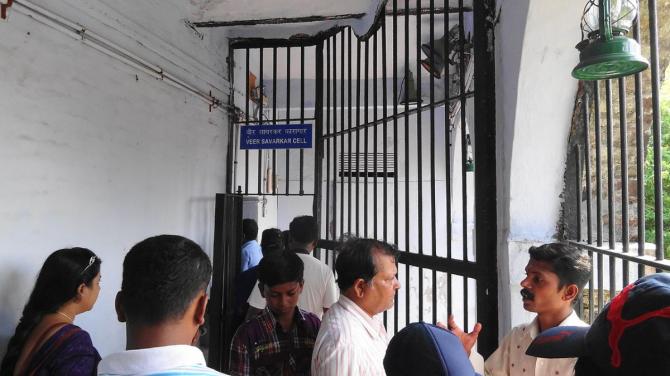
Some think that you believe in a Hindu Nation because you are a fanatic communalist. What have you to say about it?
Let us get this thing straight. People have a wrong notion of a Hindu Nation and about communalism. A Hindu means a person who regards this land of Bharatvarsha from the Indus to the Seas as his fatherland and holy land -- the land of origin of his religion and the cradle of his faith.
Therefore, the followers of Vedism, Jainism, Buddhism, Sikhism and all hill tribes are Hindus.
The Parsees, amongst the other minorities, are by race, religion, language and culture, almost akin to the Hindus.
The Christians and Jews could be politically assimilated with the Hindus.
Around this life-centre moves Hindutva -- not a religious dogma or creed but the thoughts and activities of the whole being of the Hindu race.
The problem of the minority is that of only one minority -- the Muslim minority.
A Hindu nation, therefore, is a group of people bound together by ties of common religion and culture, common history and traditions, common literature, occupying a territory of geographical unity and aspiring to form a political unit.
Therefore, in Hindusthan, the Hindus are a nation.
Those who think I am a fanatic Hindu and a communalist, are suffering from a strange malady -- hallucination.
I am neither a fanatic Hindu nor a communalist. I cannot make donkeys think like horses.

What are your views on the present state of affairs in India?
After freedom, people hoped that they would have a little peace, a little comfort, a little happiness after all that happened during the regime of the British. Their hopes have been dashed.
After 18 years of independence, we find people unhappy, miserable, demoralized and frustrated. Big projects and schemes have not yet touched the common man who is desperately fighting for his daily bread--fighting for his very existence.
The Congress party and government are filled with dead wood, old and tired men who have outlived their political usefulness to the country. They remain in power and prevent the training of young men for the tasks of tomorrow.
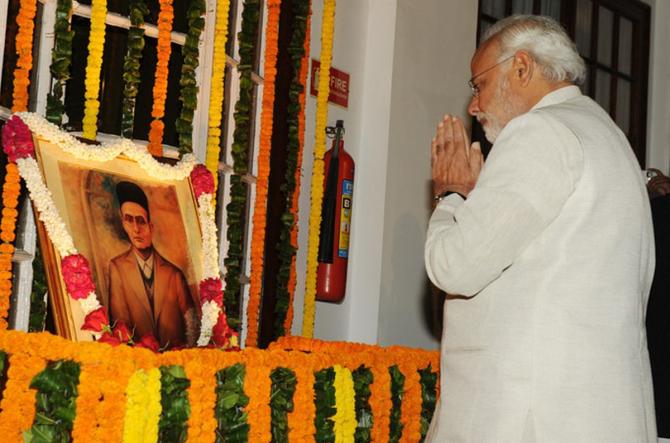
What of the future?
It is sheer madness to imagine for a moment that the country will go to pieces. A country that has produced eminent statesmen like Chandragupta, Vikramaditya, Shalivahan, Chanakya, and Shivaji can never be a politically bankrupt nation.
Hindusthan has a tradition of thousands of years of great men presiding over the destiny of Bharatvarsha in times of crisis.
As in the past, so in the future, men of destiny will always be there to guide, to serve, and to die for the motherland.
Do you think in an atomic age, militarisation of the country is essential?
Yes, I have always maintained two things: Hinduise politics and militarise the nation.
If you are strong, you can even show the shoe as Khrushchev did at the United Nations Assembly. But if you are weak, your fate will be in the hands of a powerful aggressor.
Assuming that the Congress disintegrates, do you foresee a contest for political power between a form of Hindu fascism and communism?
A Hindu of my conception is not a fascist, but a real democrat in the true sense of the word. He is also a communist in a way.
If all the Hindus who believe in the fundamentals of Hindutva unite, then the question of a contest for a political power does not arise.

And finally, is our revolution complete? Or are we still in the midst of it?
The end of our revolution has come with the attainment of our freedom. Those of us who fought for the country's liberty are naturally very happy to see it free and independent. The days of the bomb, the pistol, and the gun are over. We have now to devote ourselves to the consolidation of our hard-won freedom.
But our aim of achieving Akhand Hindusthan with its natural boundaries still remains to be fulfilled. I am old now, and the time has come for me to say goodbye to all that!
I have served the cause of my country in accordance with the dictates of my conscience. I am glad that I have lived to see my country free from bondage.
As long as the world lasts, this, our ancient land -- this, our great Bharatvarsha, will live in all its glory.
This edited excerpt from Savarkar (Part 2): A Contested Legacy, 1924-1966 by Vikram Sampath has been used with the kind permission of the publishers, Penguin Random House India.
Feature Presentation: Aslam Hunani/Rediff.com

